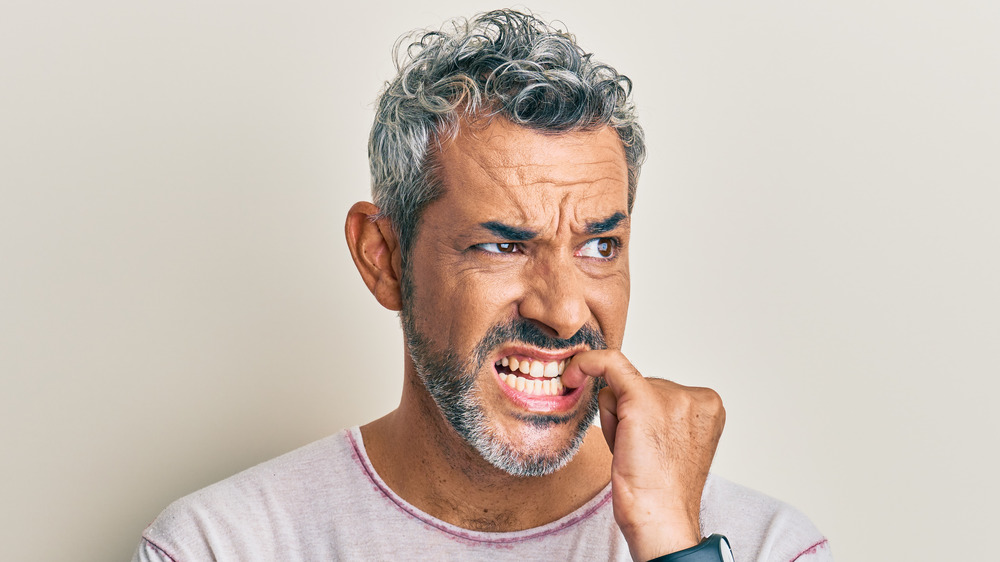Without those gorgeous teeth of yours, your smile wouldn’t exactly be the same. You likely strive to keep them white, shiny, clean, and in overall tip-top shape. But a few simple lifestyle habits could be sabotaging your good intentions and commendable efforts. Depending on the foods you eat, beverages you drink, and habits you may have, your chompers could be paying the price for your daily vices.
Of course, there are other less obvious issues that affect your oral health, as well — some of which may even happen while you’re sleeping, leaving you totally unaware. Want to keep your pearly whites strong and beautiful? According to the American Dental Association, you can do this by brushing your teeth twice a day, visiting the dentist regularly, and regularly flossing (it really does make a difference). And while you are it, you should try to cut out all of the following behaviors.
Smoking stains your teeth and damages your gums
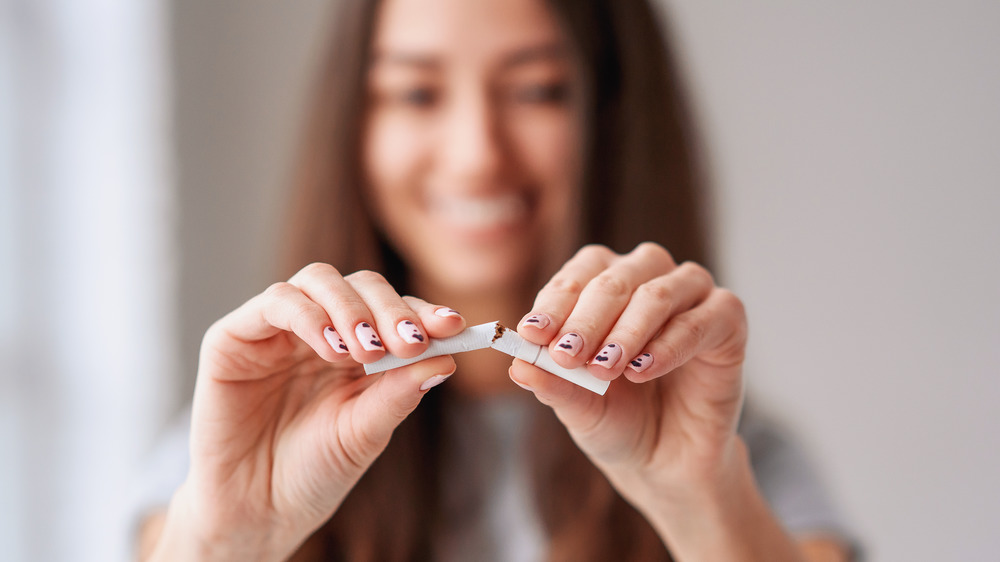
There are more than enough reasons to quit a smoking habit. Whether you have a penchant for cigarettes or puff on the occasional cigar, you’ll want to consider the very unfavorable consequences (via CDC). One likely effect of your addiction: mouth, teeth, and overall oral health issues. And as noted by WebMD, there are, of course, aesthetic issues to consider.
Smoking can discolor your teeth, making your once pearly whites stained and yellowed. Smile aside, though, it can also lead to the accumulation of plaque. Smoking also makes you more susceptible to infections, significantly drives the risk of gum disease, ups your chances of getting oral, throat, and esophageal cancers, and potentially leads to jaw bone loss. On top of this daunting list is the obvious truth that smokers often suffer from bad breath. And in case you’re wondering, yes, vaping is harmful too. While it lacks actual tobacco and smoke, there are still a plethora of chemicals that harm your gums and teeth, per Healthline.
Fortunately, there’s a bright side and a brighter smile ahead. A study published in the Journal of Clinical Periodontology showed that one year after quitting, former smokers had improved teeth, gums, and overall oral health.
Eating candy is pretty much like smearing sugar on your teeth
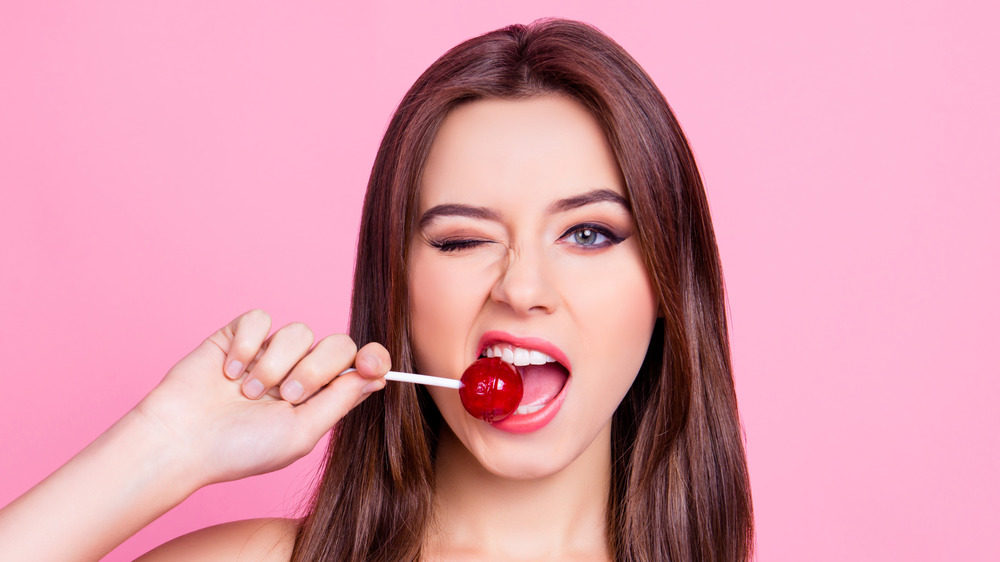
Your whole set of teeth will pay the price for your sweet tooth. If you have a soft spot for hard candies, you should understand that biting down on them is not great — and letting them gradually dissolve in your mouth is not much better. According to Healthgrades, sucking on candy for a long time essentially smothers your teeth in sugar. Piercing your teeth through lollipops and other goodies, on the other hand, can cause crushed candy pieces to get stuck in and between your teeth.
What’s even worse, though, are sour candies. As noted by Healthline, these mouth-puckering gummies have certain acids that can aggressively wear on your teeth. What’s more, the gooey consistency makes them adhere to teeth, which can cause decay.
But don’t worry, you can still splurge on treats without paying the price in dental bills. Texas-based dentist Ana Paula Ferraz-Dougherty told Aquafresh, “Chocolate is one of the better candies because it washes off your teeth easier than other types of candies.” Better yet, many dentists recommend chewing sugar-free gum after meals as it can neutralize and wash away certain acids, as explained by Healthgrades.
Drinking citrus juice damages your teeth enamel
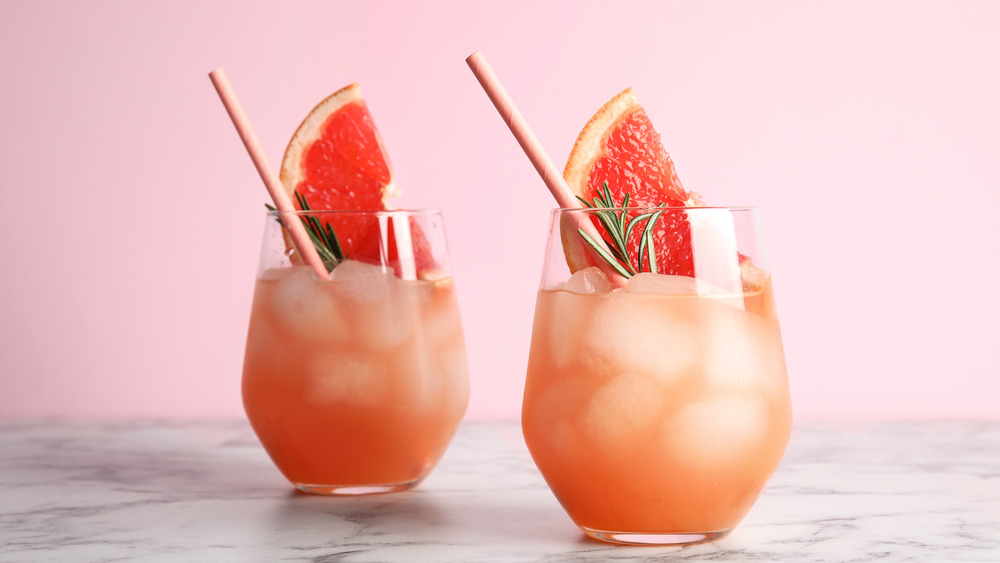
Shutterstock
That big tall glass of orange juice you enjoy at breakfast may give you your daily dose of Vitamin C, but it also could expose your teeth to lots of sugar and erosive citric acid. A study out of the University of Rochester Medical Center and published in the Journal of Dentistry found that OJ can decrease enamel hardness by a whopping 84 percent, while creating an uneven and rough surface (via Science Daily). “The acid is so strong that the tooth is literally washed away,” lead researcher and dentist YanFang Ren told Science Daily.
And it is not just your favorite morning juice that can do this type of damage. Lemon and grapefruit juices are just as bad, according to another study (via CNN). What’s more, even squeezing a lemon or lime into a glass of water or beverage of choice is enough to drive up a drink’s acidity level and make it potentially harmful to your smile, Healthline revealed.
Sipping soda leads to cavities
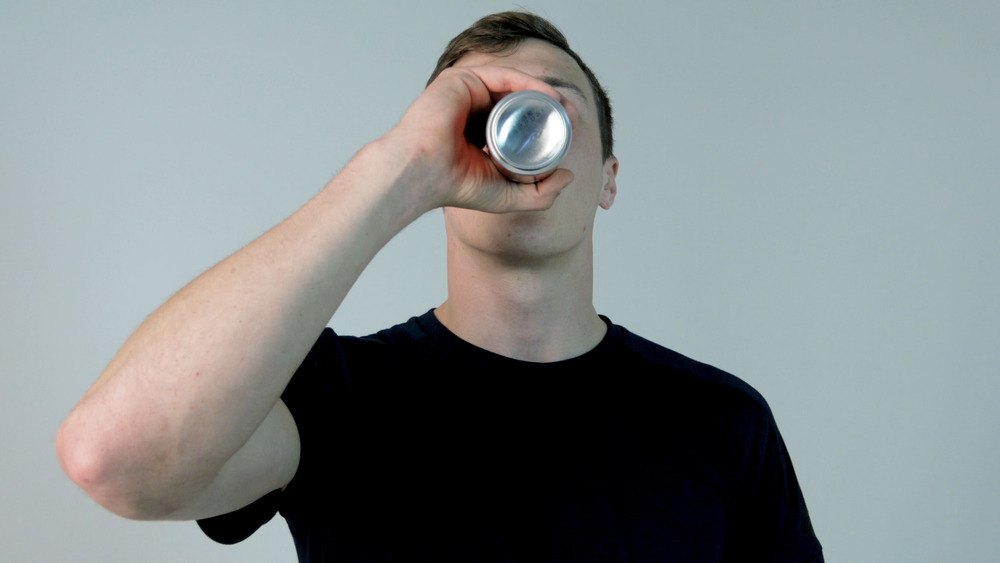
Shutterstock
Love your bubbles? Sorry to be the bearer of bad news, but regularly drinking soda is not helping keep your smile bubbly and bright. Yes, traditional cola has lots of sugar, but diet is really not much better for your teeth. Both are highly acidic and create “a damaging reaction that lasts for about 20 minutes,” as explained by Healthline. More problematic than an occasional soda is all-day soda sipping, the teeth don’t get a break from the assault. This habit is essentially a catalyst for erosion and cavities.
So how can you have your carbonated beverage without ruining your teeth? Do not savor your drink by drinking it slowly. As recommended by Healthline, drink it quickly so that your mouth is exposed to the acidic chemical reaction for a shorter period of time. Choose to sip with a straw to avoid the acid touching as much enamel surface area as possible. Finally, don’t brush right away. This might seem counterintuitive, but as indicated by research out of Zhejiang University, you actually want to spare your teeth from aggressive brushing for one hour after direct acid exposure. Instead, rinse your mouth out with water once you have had your last taste (via Healthline).
Perpetual snacking can cause tooth decay
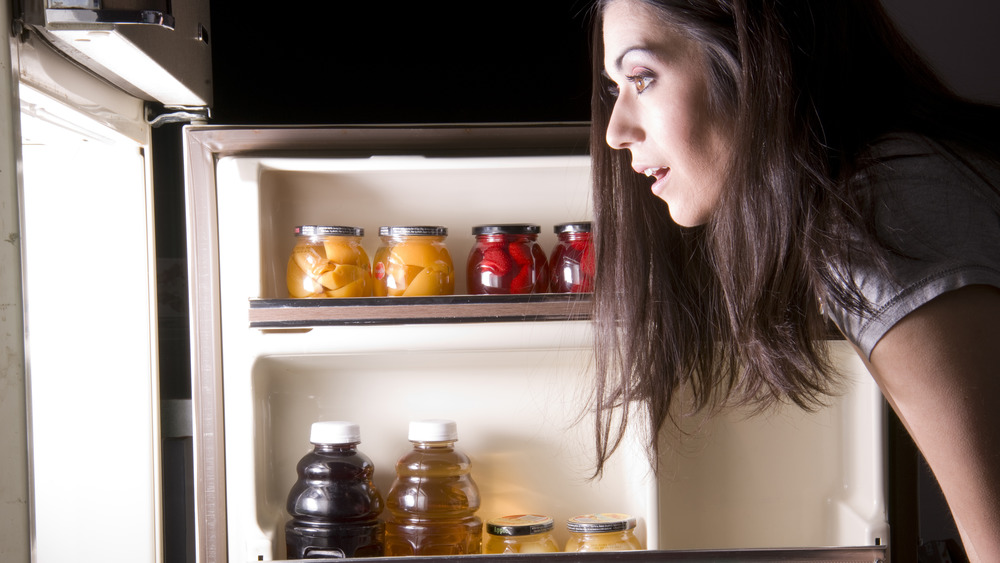
Shutterstock
Got a nonstop case of the munchies? All-day grazing may not only add to your waistline, it may also affect your oral health. Perpetually snacking throughout the day means that you are also nonstop exposing your mouth to acid, which forms and builds up when food comes into contact with the natural bacteria on your gums and tongue, dentist Steven Lin explained in an article for Verywell Health.
This chemical reaction can wear on the enamel of those pearly whites and, ultimately, foster erosion, decay, and disease. Of course, this overall unpleasantness does not have to result in the complete denial of between-meal bites. Just try not to eat all day, every day. Instead, stick to set meal and snack times, plan ahead so you are less likely to make impulsive decisions, and while you are at it, try to avoid packaged processed items with loads of sugar; rather, opt for whole foods like veggies, nuts, and other nutrient-rich eats (via Verywell Health).
Sipping coffee weakens your teeth

Shutterstock
Coffee addicts, beware. You may love your java with a passion, but that bottomless cup of joe will eventually make you want to smile less — at least with your teeth showing. The tannins in coffee adhere to your enamel and can create stains that cause yellowing. Fortunately, these can often be cleaned and removed at home or by a dentist.
Less encouraging? Constantly drinking coffee drives up the acidity in your mouth and erodes the protective layer on your teeth, as noted by Healthline. In time, this can make your teeth weaker.
Before you despair, understand that you do not have to give up your favorite beverage completely. Just try to avoid nursing that Venti macchiato all day, and swap out your afternoon percolated pick-me-up for something less offensive to your teeth. Even better, wean yourself off the added milk and sugar — these add fuel to the acidic fire. You can also drink your coffee with a straw to somewhat limit your enamel’s exposure. And then when you are finally done sipping? Rinse your mouth out with some water to wash away some of the acid (via Healthline).
Drinking wine will have you saying goodbye to a white smile

Shutterstock
A nightly glass of wine or a cocktail can put a giddy grin on your face, but it can also wipe the luster off your pretty white teeth. Dentist Timothy Chase told Healthline ,”If you have a preference for … drinking red wine, say goodbye to a white smile.”
There’s sort of good news for beer lovers though: Brewskis are slightly less offensive when it comes to discoloring teeth, but their acidity level in is still rather high, so chug with caution. Additionally, dentist Joseph Banker told the site that spiked beverages can dehydrate your mouth. In other words, drinking alcohol will limit the natural saliva which otherwise would work to rinse and eradicate bacteria from your mouth. Yet another reason to sip a glass of water alongside that margarita — less chance for a hangover and a nasty cavity.
Chewing on ice can chip your teeth and wear away your enamel
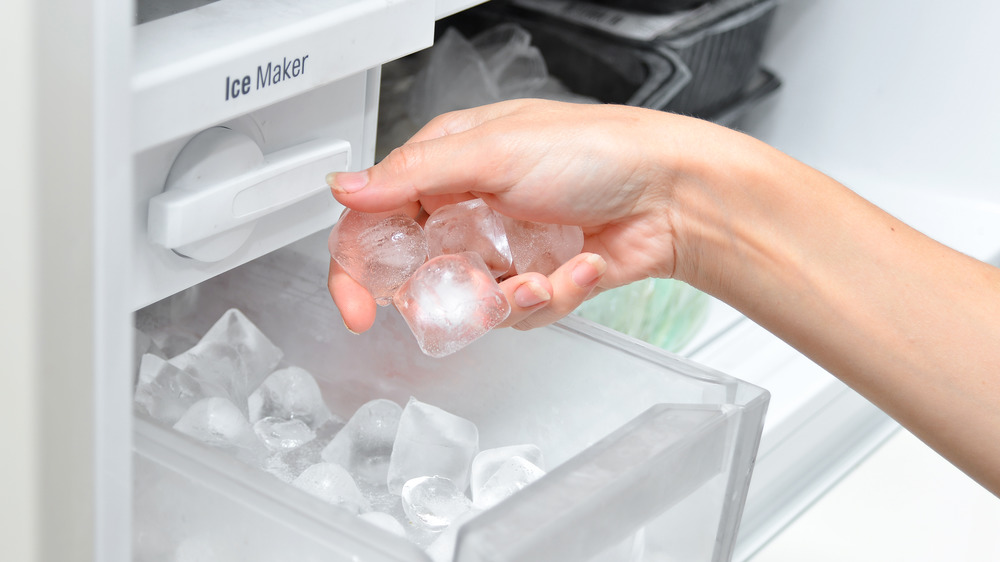
Shutterstock
You probably think nothing of it if you nervously crunch on ice cubes after finishing a drink. But it can actually do rather significant damage to your chompers. Of course, occasionally chewing an ice cube probably will not hurt you too much. If it becomes habit or compulsive behavior, though, your teeth will pay the price. As noted by Healthline, hard ice will eventually wear away the enamel of your teeth, exposing more sensitive layers and also making them more likely to get cavities.
Biting into hard ice can even damage crowns, fillings, veneers, and other dental work (via Colgate). Ice can even cause chips in your teeth. If you really love the refreshing feel of ice in your mouth, let it melt down instead of chewing it. Or you can try shaved or pre-crushed ice; both are less likely to do damage to your teeth than regular ice cubes.
Bulimia can cause noticeable damage to teeth in mere months
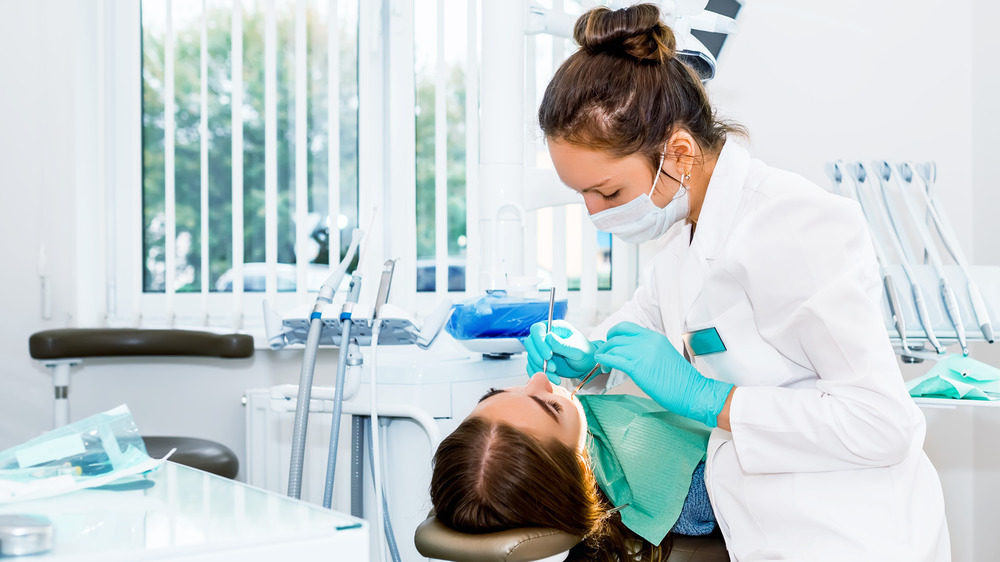
Shutterstock
People with the eating disorder bulimia nervosa often experience teeth troubles. Forcing oneself to vomit regularly exposes the mouth and teeth to erosive gastric acid, which, in turn, can degrade the enamel of the teeth. In a study of self-induced vomiting’s effects on teeth published in BMC Oral Health, “dental erosions were found in 46 individuals (69.7%), 19 had enamel lesions only, while 27 had both enamel and dentine lesions.”
As noted by Verywell Health, the degree of erosion can vary. Those who vomit multiples times in a single day are more likely to see a greater effect on the appearance of their teeth. In fact, according to the site, about six months of regular “self-induced vomiting” will take a noticeable toll. People with bulimia are also more likely to get cavities, especially if binging on sugary snacks and foods before vomiting.
If you are struggling with an eating disorder, or know someone who is, help is available. Visit the National Eating Disorders Association (NEDA) website or contact NEDA’s Live Helpline at 1-800-931-2237. You can also receive 24/7 Crisis Support via text (text NEDA to 741741).
A glass of warm milk before bed may be relaxing, but it creates a feast for bacteria

Shutterstock
Babies often fall asleep with a bottle of milk in their mouths. But there is a reason you are supposed to cut off their bedtime supply at a certain age. When they begin to get teeth, it is no longer advisable to allow milk to swirl around in their mouths as they nod off to Snoozeville.
As noted by WebMD, even young children can suffer damage to their teeth if their baby teeth are exposed to the sugars in drinks for extended periods of time without being washed away. Since saliva content dries up slightly during sleep, the mouth’s natural cleaner can’t serve its purpose either.
This same principle applies to adults who turn to a warm glass of milk in the evening, or really anything other than water, without brushing their teeth after. “Drinking milk is like giving [germs] a feast! If the bacteria digest the sugar and excrete acid onto your still weakened enamel, it can prompt tooth decay,” explained dentist Erik Swanson on his site.
Your tongue piercing could chip your teeth
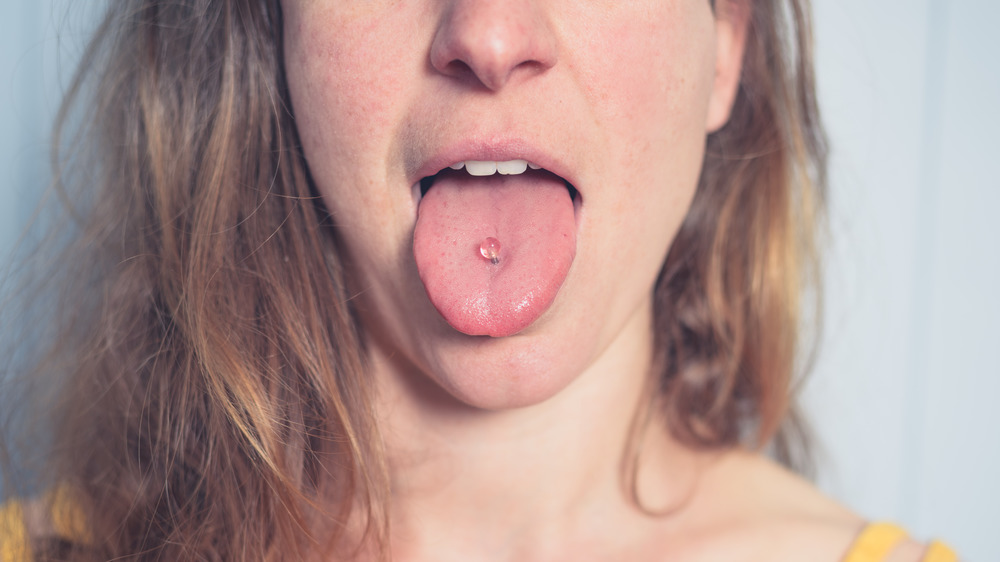
Shutterstock
Want to express yourself? Maybe get a second hole in your ear and skip the tongue piercing altogether. A study published in the Journal of Periodontology found that people with barbell-style tongue piercings are more likely to have dental issues such as chipped teeth and gingival recession (receding gums).
Those with shorter barbells actually tend to have greater incidence of chipping, likely because the embellishment can more easily fit in between teeth (via WebMD). People have a tendency to fiddle and play with their tongue piercings, so this makes sense. Longer barbells, however, are more likely to damage an individual’s gums. Basically, it is a lose-lose situation — there’s just no such thing as a teeth-friendly tongue piercing.
In a press release, president of the American Academy of Periodontolgy, Dr. Kennth Bueltmann, advised talking about “potential risk factors with your dentist before [getting a] mouth piercing. Taking precautions now will increase your chance of keeping your teeth for a lifetime instead of needing dentures” (via WebMD).
Grinding your teeth will wear away at enamel
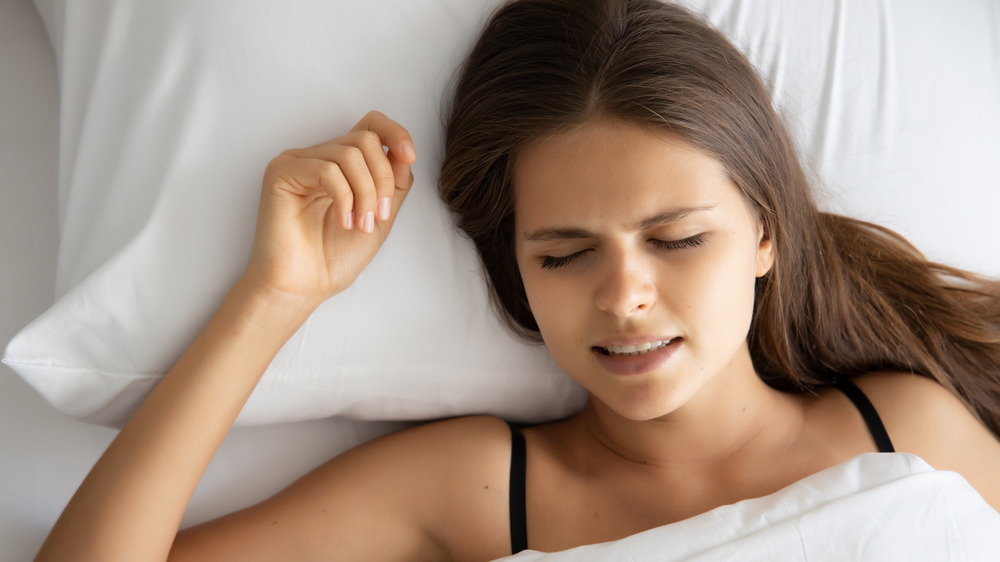
Shutterstock
Bruxism is the involuntary grinding of teeth, and it often happens during sleep. It can be caused by stress or certain medications, or it can happen as a natural result of how a person’s teeth are aligned (via WebMD). What’s more, it can accompany sleep apnea and take place without you even realizing it. Regardless of what’s causing it, it can erode your teeth — quite literally. Dentist Kimberly Harms explained to WebMD, “In the long term, the friction can wear away at enamel and fracture fillings.”
So how can you stop this from happening? Talk to your dentist if you find yourself doing this during your waking hours. In the meantime, try resting your tongue up against your front teeth or between the top and bottom. If you find you’re experiencing frequent headaches and jaw pain, it’s conceivable you’re grinding your teeth together while sawing logs. You may need a mouth guard — and possibly even a prescription for a muscle relaxer (via WebMD).
Forgetting to floss means you’re only partially cleaning your teeth
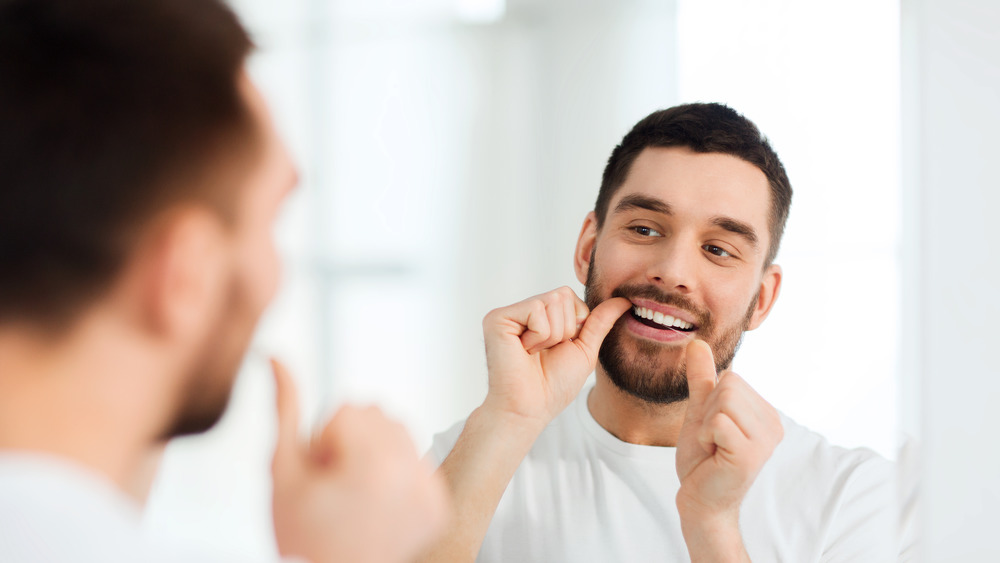
Shutterstock
We hate to break it to you, but your dentist knows when you’re lying about regularly flossing (via Prevention). But, truthfully, who among us has not skipped that daily ablution from time to time?
While regular brushing with minty paste leaves our mouths feeling and tasting clean, sliding a piece of string between each tooth is not nearly as satisfying an experience. Even many dentists know this to be true. Professor of dental hygiene, Dr. Alla Wheeler, told WebMD, “There is no instant gratification with flossing — that’s the problem. Patients don’t think it does anything.”
The reality is though that flossing can make a huge difference in your overall mouth health. In fact, it can eradicate 40 percent of bacteria from your teeth. “Each tooth has five surfaces. If you don’t floss, you are leaving at least two of the surfaces unclean. Floss is the only thing that can really get into that space between the teeth and remove bacteria,” Dr. Wheeler told the site.
Biting your nails can shift the alignment of your teeth

Shutterstock
Many people nibble on their nails — whether they are feeling nervous, simply fidgeting, or just biding their time (or should we say biting?). Cosmetic dentist Elisa Mello told Everyday Health that perpetually chewing at your fingernails can alter your smile and even shift the positioning of your teeth. What’s more, it could damage the enamel or even cause chipping.
Similarly, biting on your pencil or a pair of glasses can create “microfractures” to your smile that may add up and become visible over time. And do not even think about using your teeth in place of scissors to tear off tags or open packages — nor should you use your incisors as a bottle opener. Dentist Richard Price put it plainly when speaking with Everyday Health: “Teeth are not pliers, teeth are not hooks.” Take the extra moment to find the tool you need or your teeth may pay the price for your impatience.

